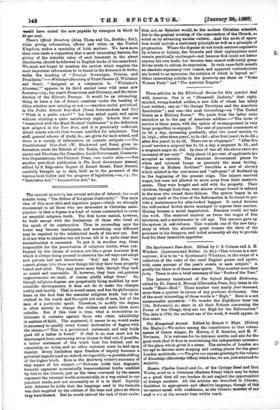The current Quarterly has several articles of interest, the most
notable being "The Ethics of Religious Conformity." The main idea of this most able and ingenious paper—which we strongly recommend to all those who are interested in Christian meta- physics—is that a dogma is a kind of house constructed to cover an essential religious truth. The first house cannot, however, be built except with the limitations of those who lived at the epoch of its construction. Thus in succeeding ages the house may become inadequate, and something very different may be required by the intellectual needs of the new era. But it is not wise to abandon the old house till it is quite clear that reconstruction is necessary. To put it in another way, those responsible for the preservation of religious truths, when con- fronted by the claims of science, are like a great business firm which is always being pressed to abandon the old ways and adopt new patents and new inventions. But,' say the firm, we cannot plunge into these new things till they have been properly tested and tried. They may prove mere fads, though they look so sound and reasonable. If, however, they turn out genuine improvements we shall, of course, gladly adopt them.' So, though religious dogmas are perpetually being modified by new scientific developments, it does not do to snake the changes rashly and hastily. That is sound sense, and has its philosophic basis in the fact that the essential religion' truth has to be clothed in the words and thoughts not only of men, but of the men of a particular epoch. Therefore, to modify the dogma is often merely to change the clothes and make them more suitable. But if this view is true, what a tremendous in- dictment it contains against those who claim infallibility in matters of faith. The argument, it seems to us, would make it necessary to qualify every formal declaration of dogma with the clause,—" This is a provisional statement, and only holds good till a better is found." If that is so, men must not be discouraged from canvassing every dogma to find out, if possible, a better statement of the truth that lies behind, and no censorship, no index, and no other restraint must be laid upon inquiry. Every limitation upon freedom of inquiry becomes a potential impiety (and so, indeed, we regardit),—a possible stifling of the higher truth. Here is the Quarterly writer's summary of this aspect of his subject :—" Newman holds that dogmatic formulw represent economically transcendental truths confided by God to the Church, just as the ideas conveyed by the senses represent the external world, economically, in a way suited to our practical needs, and not necessarily as it is in itself. Equally with Sabatier ho holds that the language used in the forrauhe was that supplied by the culture of the time and place at which they were framed. But he would entrust the task of their evolu- tion, not, as Sabatier would, to the modern Christian scientist, but to the gradual working of the organisation of the Church, as acted on by advancing secular miter& And the mode of opera- tion would include a stationary principleni well as a principle of progression. Where the dogmas do not touch matters cognisable by science or history, the formulas and their explanations must remain practically unchanged—not because God could not better express his own truth, but because man cannot sufficiently grasp divine truth to reform its expression. In such cases faith asserts an absolute supremacy over reason, and apparent contradictions are bowed to as mysteries, the solution of which is beyond us." Other interesting articles in the Quarterly are those on "Some Women Poets" and "The Austrian Empire."


















































 Previous page
Previous page